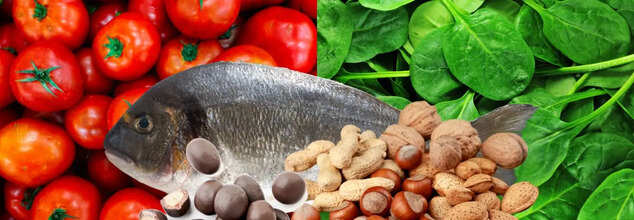
Credit: Canva
Want To Have A Healthier Heart? Drink Tomato Soup And Munch On Spinach Chips
SummaryHeart is one of the important organs in the human body and therefore, it is pivotal to take care of this muscle with proper diet and exercise. Food items like tomatoes, avocado and spinach are great options to boost cardiovascular health.
The trick is simple. If you want to live longer, you eat a healthy diet and trust me, people on the internet will always make sure that you know everything about diet and longevity. However, can you trust everything you see online? Certainly not, particularly when it comes to vital organs like your heart.
But do not worry, this article lists 8 foods, vegetables and fruits, that can significantly boost your cardiovascular health and help you prevent conditions like high blood pressure, angina or even cardiac arrest.
Leafy Green Vegetables
Spinach, kale, and collard greens are rich in vitamins, minerals, and antioxidants. They provide a substantial amount of vitamin K, which supports arterial health and proper blood clotting. Additionally, their high dietary nitrate content helps lower blood pressure, reduce arterial stiffness, and enhance blood vessel function. According to the American Heart Association (AHA), an increased intake of leafy greens correlates with better cardiovascular health and a reduced risk of heart disease.Whole Grains
Whole grains, including brown rice, oats, rye, barley, buckwheat, and quinoa, contain the germ, endosperm, and bran—key components that offer health benefits. Unlike refined carbohydrates, which heighten the risk of coronary heart disease, whole grains are protective. Studies indicate that consuming whole grains daily can lower the risk of cardiovascular disease, coronary heart disease, and stroke. The AHA recommends prioritizing whole grains over refined grains to manage hypertension and maintain heart health.Berries
Strawberries, blueberries, blackberries, and raspberries are packed with antioxidants like anthocyanins, which combat oxidative stress and inflammation—two factors linked to heart disease. Regular berry consumption may lower the risk of coronary artery disease, improve vascular function, and reduce metabolic syndrome markers. Including a variety of berries in the diet can support overall cardiovascular health.Avocados
A great source of monounsaturated fats, avocados are linked to reduced cholesterol levels and a lower risk of heart disease. Eating two servings of avocado per week can significantly decrease the risk of cardiovascular disease and coronary heart disease. Additionally, their high potassium content aids in blood pressure regulation, with a single serving providing a substantial portion of the daily recommended intake.Fatty Fish and Fish Oil
Fatty fish such as salmon, mackerel, sardines, and tuna are abundant in omega-3 fatty acids, which play a crucial role in heart health. These fatty acids help reduce cholesterol, triglycerides, and blood pressure while lowering the risk of cardiovascular disease. For those who do not consume fish, fish oil supplements can serve as an alternative source of omega-3s.Walnuts
Rich in fiber, magnesium, copper, and manganese, walnuts contribute to heart health by lowering LDL (bad) cholesterol and overall cholesterol levels. Studies suggest that regular consumption of walnuts is associated with a reduced risk of heart disease.Dark Chocolate
With high levels of flavonoid antioxidants, dark chocolate offers heart-protective benefits. Consuming it in moderation—preferably varieties with at least 70% cocoa—can help lower the risk of coronary heart disease and stroke.Tomatoes
Tomatoes are an excellent source of lycopene, a powerful antioxidant that neutralizes free radicals and reduces inflammation. Regular consumption of tomatoes or tomato-based products has been linked to improved cholesterol levels and reduced cardiovascular disease risk.End of Article
© 2024 Bennett, Coleman & Company Limited

